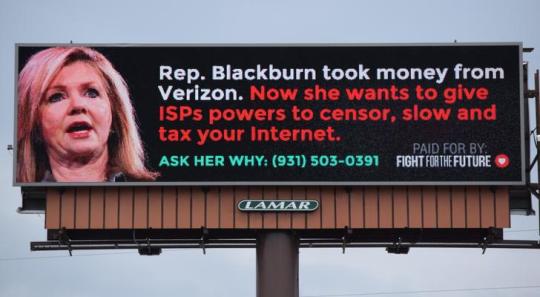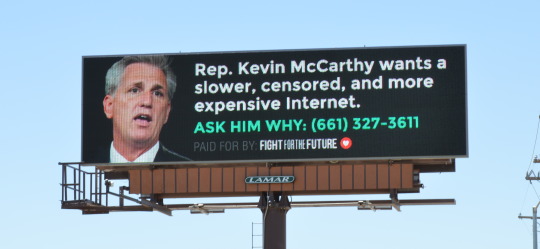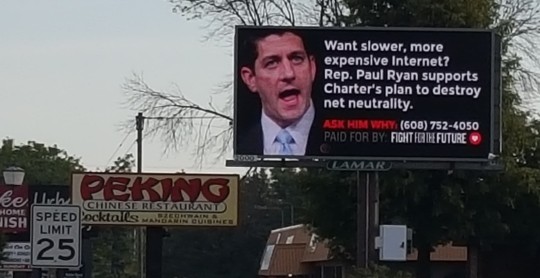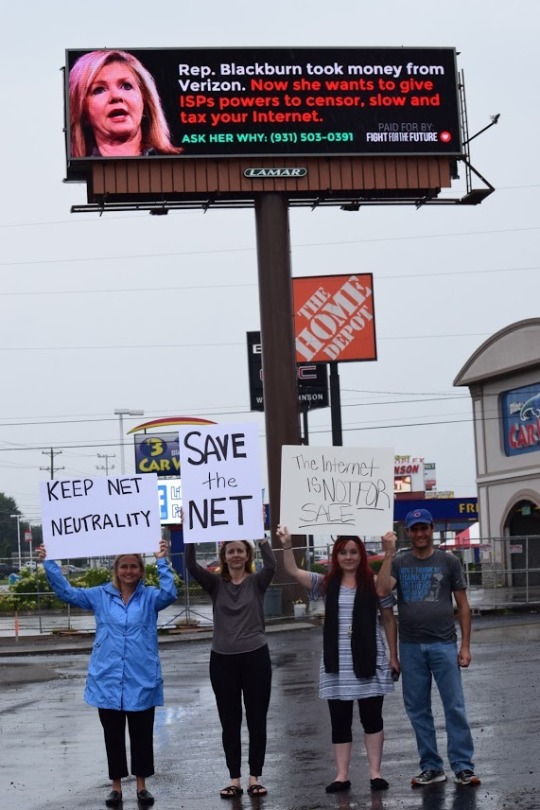Net neutrality activists launch crowdfunded billboards targeting key members of Congress during August recess

FOR IMMEDIATE RELEASE, August 15, 2017
Contact: Tiffiniy Cheng, 413-367-6255, press@fightforthefuture.org
Billboards in six states single out lawmakers who support the FCC’s plan to gut key safeguards preventing ISPs from charging new fees, slowing traffic, or blocking websites
Today digital rights organization Fight for the Future unleashed a series of crowdfunded billboards targeting lawmakers who support FCC Chairman Ajit Pai’s efforts to repeal the country’s net neutrality rules.
With members of Congress back in their home districts, the billboards – paid for by hundreds of small donations – appear in six different states just weeks before the FCC’s final deadline for public input on their proposal to gut net neutrality rules that prevent companies like Comcast, Verizon, and AT&T from charging extra fees, throttling, or blocking websites, apps, and online services.
See PHOTOS of some of the billboards here: https://imgur.com/a/lhEko
Since the massive July 12th day of action, millions have contacted their representatives – who have oversight over the FCC – to ensure these key protections are not changed or removed. The billboards send a strong message to any Members of Congress contemplating support for the FCC’s plan to repeal net neutrality, which is currently being tracked through a “congressional scorecard” on BattleForTheNet.com. So far very few lawmakers have been willing to publicly support Ajit Pai’s plan, likely in light of polling that shows voters – including Republicans – overwhelmingly oppose it.

The billboards encourage constituents to contact their elected representatives; for example, Speaker Paul Ryan’s billboard in Janesville, WI asks, “Want slower, more expensive Internet? Rep. Paul Ryan supports Charter’s plan to destroy net neutrality. Ask him why: (608) 752-4050.”
The outdoor ads feature some of the few members of Congress who came out with early support for FCC’s plan to repeal net neutrality rules, including:
- Clarksville, TN – Rep. Marsha Blackburn (Sources: USA Today, Energy and Commerce Committee media release or Ars Technica).
- Dalton, GA – Rep. Tom Graves (Sources: Represent.us, media release or Twitter).
- Bakersfield, CA – Rep. Kevin McCarthy (Sources: The Hill, Axios, or TechCrunch).
- Janesville, WI– Rep. Paul Ryan (Sources: The Hill or The Hill).
- Rapid City, SD – Sen. John Thune (Source: Energy and Commerce Committee media release).
- Jackson, MS – Sen. Roger Wicker (Sources: INCOMPAS poll, Mozilla poll, or media release).
“Politicians need to learn that they can’t attack free speech on the Internet and expect to get away with it,” said Evan Greer, campaign director of Fight for the Future (pronouns: she/hers), “Voters from across the political spectrum all agree that they don’t want companies like Comcast and Verizon dictating what they can see and do online. No one is fooled by corrupt lawmakers’ attempts to push for bad legislation while they strip Internet users of protections at the FCC. Hundreds of people donated to make these billboards possible. When you come for the Internet, the Internet comes for you.”

The billboards highlight the increasing scrutiny on Congress – who have important oversight authority over the FCC. With no viable legislation on the table, net neutrality supporters remain opposed to any attempt at legislation that would undermine the strong rules at the FCC, which were fought for by millions of Americans, and are calling on lawmakers to publicly oppose Ajit Pai’s plan, and require the FCC to act with transparency and address serious irregularities in its rulemaking process.
Fight for the Future was also one of the leading organizations behind the historic Internet-Wide Day of Action for Net Neutrality on July 12, which drove a record breaking 2 million+ comments to the FCC and Congress in a single day. Learn more at fightforthefuture.org

SOURCES FOR BILLBOARDS:
Where do the featured lawmakers stand?
- Rep. Marsha Blackburn: USA Today, Energy and Commerce Committee press release or Ars Technica.
- Rep. Tom Graves: Represent.us, Rep. Graves’ press release or @RepTomGraves tweet.
- Rep. Kevin McCarthy: The Hill, Axios, or TechCrunch.
- Rep. Paul Ryan: The Hill or The Hill.
- Sen. John Thune: Energy and Commerce Committee press release.
- Sen. Roger Wicker: INCOMPAS poll, Mozilla poll, or Energy and Commerce Committee press release.
What is at stake if we lose strong net neutrality rules?
“Under the current net neutrality rules, broadband providers like Comcast and Charter, and wireless providers like AT&T and Verizon, can’t block or slow down your access to lawful content, nor can they create so-called “fast lanes” for content providers who are willing to pay extra.” Source: WIRED
‘In dispute are a set of U.S. federal regulations saying that internet providers should not slow down, block or charge websites extra fees while treating other sites differently. The Federal Communications Commission is currently weighing how to repeal those so-called “net neutrality” rules, in a move that’s expected to benefit internet providers such as Verizon and AT&T.’ Source: The Washington Post
###

